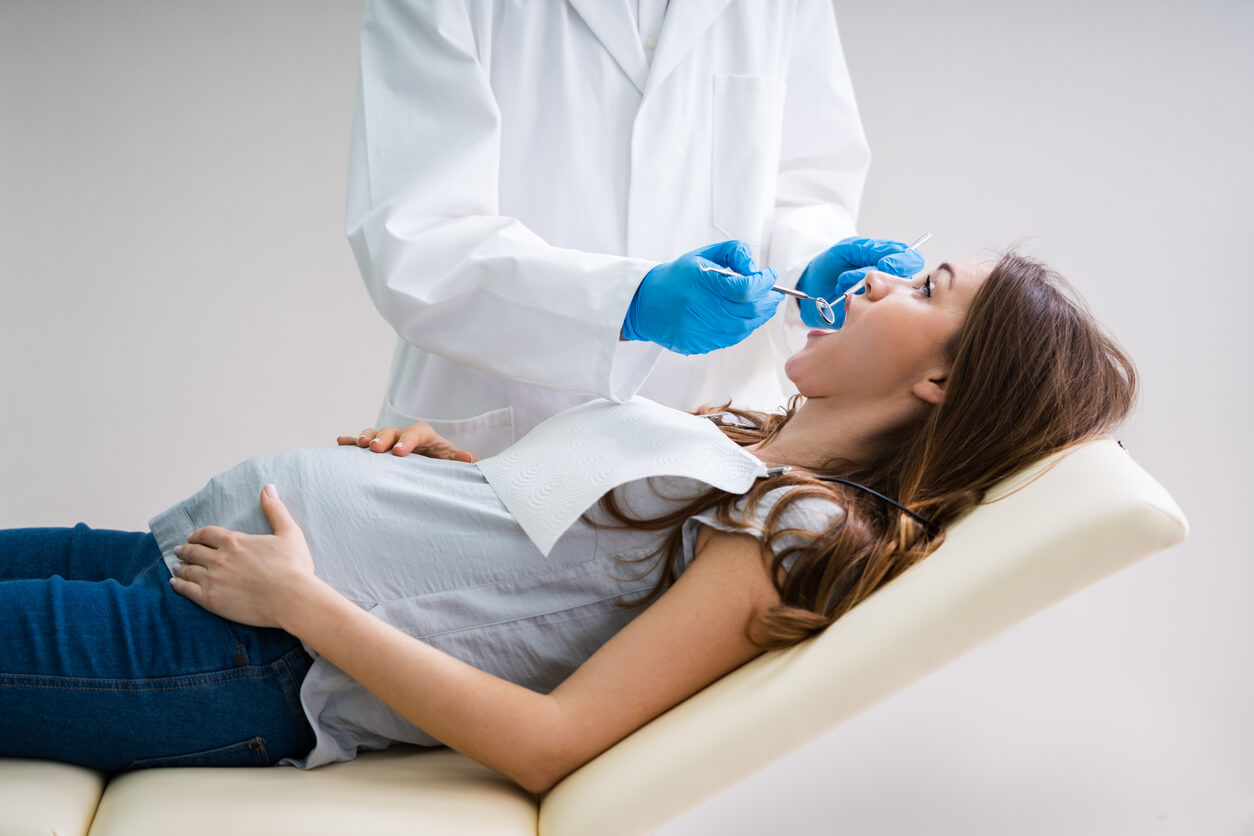3 Things You Should Know About Your Mouth During Pregnancy

The body of the mother-to-be undergoes many transformations while carrying a baby, and with them come hundreds of doubts. Therefore, in this article, we’ll tell you everything you should know about your mouth during pregnancy.
Hormonal changes, increased irrigation of the gums, nausea, and cravings can increase the risk of suffering from oral diseases at this stage. And some of these can lead to serious gestational complications.
That’s why it’s important to know in advance what happens to your mouth during pregnancy and how to keep your oral health in good condition. Keep reading on and find out.
1. When it’s good to visit the dentist
Ideally, the first visit to the dentist should take place before you become pregnant, when you plan your pregnancy. This way, the professional will have the opportunity to perform all the necessary treatments to leave your mouth healthy before conception.
Once pregnancy is confirmed, it’s also necessary to visit the dentist and inform them about your new condition. You should even make an appointment for each trimester, so that the professional can assist you and provide you with the necessary care.
“When a woman plans to become pregnant or knows of her pregnancy, she should request a check-up visit with her dentist.”
-Spanish Society of Pediatric Dentistry-.
If performing any procedure is necessary, the professional will indicate the right time to do it. Ideally, interventions should be coordinated for the second trimester, as it’s the safest time for the baby and the most comfortable for you.
Your dentist will also perform some preventive practices, such as dental cleanings and fluoride topications when deemed appropriate. In addition, they’ll teach you how to keep your baby’s mouth healthy and what to keep in mind to preserve your baby’s oral health at birth.
You should know that during pregnancy, it’s safe to receive anesthesia and get fillings, root canals, and extractions. And if your dentist thinks it’s appropriate, they can also take X-rays with the proper protection.
In case you need them, the professional can prescribe safe medications to use during pregnancy. Therefore, if you have any problems in your mouth during pregnancy, it’s very important that you go to your trusted dentist.

2. Changes that occur in the mouth during pregnancy
The mouth is no stranger to gestational changes, as hormones affect all body tissues. But changes in diet and hygiene habits also play their part.
These are the most frequent alterations that women suffer in their mouths during pregnancy:
- Gingivitis: the gums become inflamed and red, swollen, uncomfortable, and bleed easily. This problem is associated with the presence of bacterial plaque and tartar on the teeth, due to inadequate oral hygiene. Although hormonal changes and increased tissue irrigation also favor its appearance.
- Periodontitis: this is the evolution of untreated gingivitis, in which pathogenic germs attack the tissues that support the teeth. The infection is located at a deeper level, which favors the destruction of the maxillary bone. For this reason, it’s common for some dental pieces to move and even get lost. But this isn’t all, because this disorder is also associated with gestational complications. Therefore, its timely treatment is essential.
- Cavities: Pregnant women may change their oral hygiene habits by avoiding brushing due to nausea or gum discomfort. In addition to this, the oral environment is acidified by vomiting and reflux and even by cravings for sweet foods. In turn, hormones produce oral dryness, which limits the protective lubrication of saliva. All these conditions favor the appearance of cavities and consequent dental destruction.
- Epulis gravidarum is a benign tumor located in the gum, which is generated when the gum becomes inflamed. It hurts, bleeds, and makes speech and chewing difficult. However, it disappears by itself after childbirth.
- Xerostomia: hormonal changes cause less saliva production in some women, which increases the risk of cavities and bad breath.
3. The condition of a woman’s mouth during pregnancy influences her baby’s health
What happens in the mouth has repercussions in other parts of the body. Thus, in pregnant women, oral conditions have an influence on the developing baby.
A mother who has cavities or periodontitis has a higher risk of suffering gestational complications. For example, premature births, contractions, low birth weight, and preeclampsia.
In addition, poor oral health of the mother can condition the oral health of the baby after birth. It’s worth mentioning that dental problems are associated with the presence of a high number of germs in the mouth and these are transmitted through saliva.
A mother with a lot of bacteria in her mouth can pass them on to her child due to the permanent proximity between the two. This increases the risk of the infant suffering from oral problems in the future.

How to take care of your mouth during pregnancy
To keep your mouth healthy and avoid complications while you’re pregnant, it’s important to pay attention to the following care aspects:
- Brush your teeth after every meal or at least twice a day for 2 minutes.
- Use dental floss to clean the area between your teeth.
- Complement your hygiene with fluoride toothpastes and appropriate dental rinses, if your dentist tells you to do so. If they make you nauseous, you can change the flavor.
- Drink plenty of water and avoid sugary drinks and carbonated soft drinks.
- Maintain a balanced, nutritious, and varied diet. Try to consume foods that are rich in calcium, vitamins, and minerals. And reduce the intake of sugar and ultra-processed foods.
And as we already told you, remember to visit the dentist every trimester. By practicing good oral care, you can enjoy being pregnant and smile with a healthy mouth.
The body of the mother-to-be undergoes many transformations while carrying a baby, and with them come hundreds of doubts. Therefore, in this article, we’ll tell you everything you should know about your mouth during pregnancy.
Hormonal changes, increased irrigation of the gums, nausea, and cravings can increase the risk of suffering from oral diseases at this stage. And some of these can lead to serious gestational complications.
That’s why it’s important to know in advance what happens to your mouth during pregnancy and how to keep your oral health in good condition. Keep reading on and find out.
1. When it’s good to visit the dentist
Ideally, the first visit to the dentist should take place before you become pregnant, when you plan your pregnancy. This way, the professional will have the opportunity to perform all the necessary treatments to leave your mouth healthy before conception.
Once pregnancy is confirmed, it’s also necessary to visit the dentist and inform them about your new condition. You should even make an appointment for each trimester, so that the professional can assist you and provide you with the necessary care.
“When a woman plans to become pregnant or knows of her pregnancy, she should request a check-up visit with her dentist.”
-Spanish Society of Pediatric Dentistry-.
If performing any procedure is necessary, the professional will indicate the right time to do it. Ideally, interventions should be coordinated for the second trimester, as it’s the safest time for the baby and the most comfortable for you.
Your dentist will also perform some preventive practices, such as dental cleanings and fluoride topications when deemed appropriate. In addition, they’ll teach you how to keep your baby’s mouth healthy and what to keep in mind to preserve your baby’s oral health at birth.
You should know that during pregnancy, it’s safe to receive anesthesia and get fillings, root canals, and extractions. And if your dentist thinks it’s appropriate, they can also take X-rays with the proper protection.
In case you need them, the professional can prescribe safe medications to use during pregnancy. Therefore, if you have any problems in your mouth during pregnancy, it’s very important that you go to your trusted dentist.

2. Changes that occur in the mouth during pregnancy
The mouth is no stranger to gestational changes, as hormones affect all body tissues. But changes in diet and hygiene habits also play their part.
These are the most frequent alterations that women suffer in their mouths during pregnancy:
- Gingivitis: the gums become inflamed and red, swollen, uncomfortable, and bleed easily. This problem is associated with the presence of bacterial plaque and tartar on the teeth, due to inadequate oral hygiene. Although hormonal changes and increased tissue irrigation also favor its appearance.
- Periodontitis: this is the evolution of untreated gingivitis, in which pathogenic germs attack the tissues that support the teeth. The infection is located at a deeper level, which favors the destruction of the maxillary bone. For this reason, it’s common for some dental pieces to move and even get lost. But this isn’t all, because this disorder is also associated with gestational complications. Therefore, its timely treatment is essential.
- Cavities: Pregnant women may change their oral hygiene habits by avoiding brushing due to nausea or gum discomfort. In addition to this, the oral environment is acidified by vomiting and reflux and even by cravings for sweet foods. In turn, hormones produce oral dryness, which limits the protective lubrication of saliva. All these conditions favor the appearance of cavities and consequent dental destruction.
- Epulis gravidarum is a benign tumor located in the gum, which is generated when the gum becomes inflamed. It hurts, bleeds, and makes speech and chewing difficult. However, it disappears by itself after childbirth.
- Xerostomia: hormonal changes cause less saliva production in some women, which increases the risk of cavities and bad breath.
3. The condition of a woman’s mouth during pregnancy influences her baby’s health
What happens in the mouth has repercussions in other parts of the body. Thus, in pregnant women, oral conditions have an influence on the developing baby.
A mother who has cavities or periodontitis has a higher risk of suffering gestational complications. For example, premature births, contractions, low birth weight, and preeclampsia.
In addition, poor oral health of the mother can condition the oral health of the baby after birth. It’s worth mentioning that dental problems are associated with the presence of a high number of germs in the mouth and these are transmitted through saliva.
A mother with a lot of bacteria in her mouth can pass them on to her child due to the permanent proximity between the two. This increases the risk of the infant suffering from oral problems in the future.

How to take care of your mouth during pregnancy
To keep your mouth healthy and avoid complications while you’re pregnant, it’s important to pay attention to the following care aspects:
- Brush your teeth after every meal or at least twice a day for 2 minutes.
- Use dental floss to clean the area between your teeth.
- Complement your hygiene with fluoride toothpastes and appropriate dental rinses, if your dentist tells you to do so. If they make you nauseous, you can change the flavor.
- Drink plenty of water and avoid sugary drinks and carbonated soft drinks.
- Maintain a balanced, nutritious, and varied diet. Try to consume foods that are rich in calcium, vitamins, and minerals. And reduce the intake of sugar and ultra-processed foods.
And as we already told you, remember to visit the dentist every trimester. By practicing good oral care, you can enjoy being pregnant and smile with a healthy mouth.
All cited sources were thoroughly reviewed by our team to ensure their quality, reliability, currency, and validity. The bibliography of this article was considered reliable and of academic or scientific accuracy.
- Flores, J., Oteo, A., Mateos, L., & Bascones, A. (2004). Relación entre enfermedad periodontal y parto prematuro. Bajo peso al nacimiento: una revisión de la literatura. Avances en Periodoncia e Implantología Oral, 16(2), 93-105.
- García, R. C., Culqui, S. F., Benalcázar, R. Q., Raymi, A. C., Navarro, M. P., & Vásquez, Ó. T. (2019). Enfermedad periodontal asociada al embarazo. Revista Científica Odontológica, 7(1), 132-139.
- Carranza Villao, K. B. (2020). Gingivitis asociada al embarazo (Bachelor’s thesis, Universidad de Guayaquil. Facultad Piloto de Odontología).
- Guzmán Espinoza, K. N. (2021). Inflamación gingival asociada a factores de riesgo en el embarazo (Bachelor’s thesis, Universidad de Guayaquil. Facultad Piloto de Odontología).
- Candina, H. J. R., Batista, A. J. H., & Fonte, E. T. P. (2018). Enfermedad periodontal en gestantes del primer y tercer trimestre del embarazo. Revista Cubana de Investigaciones Biomédicas, 37(2), 18-26.
- Mancheno Valenzuela, C. L. (2021). Odontología preventiva durante el embarazo (Bachelor’s thesis, Universidad de Guayaquil. Facultad Piloto de Odontología).
- Ramos Pizaña, M. (2018). Evaluación de muestras salivales para determinación de carga microbiana cariogénica en mujeres gestantes (Doctoral dissertation, Universidad Autónoma de Nuevo León).
- Alfaro Alfaro, A., Castejón Navas, I., Magán Sánchez, R., & Alfaro Alfaro, M. J. (2018). Embarazo y salud oral. Revista Clínica de Medicina de Familia, 11(3), 144-153.
- Cuesta, A. L. (2020). Incidencia de Caries y Enfermedad Periodontal en Pacientes Embarazadas (Doctoral dissertation, Universidad Nacional de La Plata).
- Aulestia Jácome, A. N. (2022). Factores de riesgo de infectividad bucal en pacientes pediátricos. Revisión de la literatura.
- Astoreca, V., & Mercadier, M. Importancia de la promoción y prevención de la salud bucodental en la embarazada, su relación con binomio madre-hijo y cuidados del niño en la primera infancia.
This text is provided for informational purposes only and does not replace consultation with a professional. If in doubt, consult your specialist.








